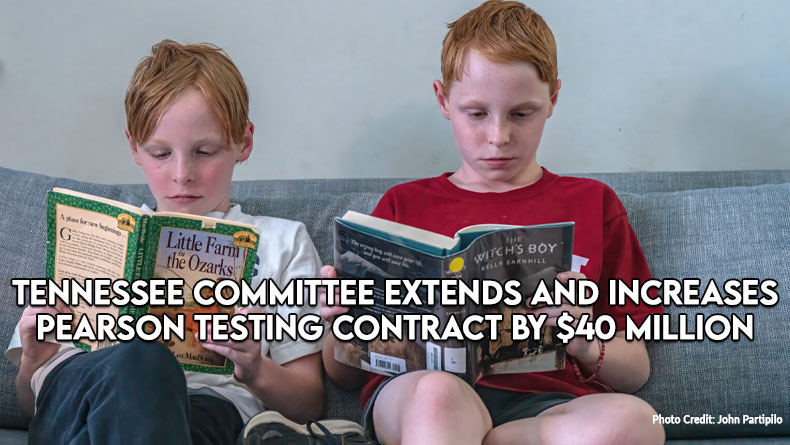The decision comes during an upheaval over state’s third-grade reading law.
Photo: From left, Third graders Charlie and Marshall Groves read in the living room of their home in East Nashville. Photo Credit: John Partipilo
By Sam Stockard [Tennessee Lookout -CC BY-NC-ND 4.0] –
Amid uproar over third-grade reading scores and the prospect of thousands of failing students, Tennessee lawmakers extended the testing vendor’s contract and bumped up the total payout by nearly $40 million.
The Legislature’s Joint Fiscal Review Committee voted Wednesday to tack on another year for British-based NCS Pearson to administer TNReady and increase the total contract to $132 million from $93 million. The state previously paid $30 million a year to Questar to handle its main K-12 test.
The NCS Pearson contract will expire June 30, 2025 instead of this June. Besides giving the test, the company is to make changes aligning with “paper-based” tests and improve data for instructional use.
The state already was paying NCS Pearson about $143 million through two contracts to handle the test. A Department of Education official told the committee Wednesday the state is working on a new request for proposals combining test administration and a separate contract with NCS Pearson for test development into one future contract award.
Last week the state lauded results of the Tennessee Comprehensive Achievement Program – the test used to judge the performance of students, teachers, schools and administrators – after 40% of third-graders scored well enough to be considered proficient by the state in reading, up from 32% two years ago.
Yet the 60% of third-graders who aren’t reading on grade level by the state’s standard could be required to go to summer school, take tutoring in the fourth grade or a combination of both. Otherwise, they could be forced to repeat the third grade.
Critics of the state law, which was approved in a special session two years ago and tweaked this year, have been hammering the Republican-controlled Legislature this week, arguing students shouldn’t be judged based on part of a score from one test. Opponents of the law also contend it is part of a bigger plan to privatize K-12 education.

Shifting the blame
State Sen. Paul Rose, R-Covington, tried to deflect some of the criticism Wednesday when he asked an Education Department official to explain how teachers are involved in every step of the test’s development. Teachers are “engaged” at several points in putting together the test, including deciding how students should perform on different parts of the test, the official said. A committee of teachers in each subject area also reviews every item that makes the test.
Rose, a member of the Fiscal Review Committee, noted he asked the question “for a purpose” and pointed out there are “a lot of unhappy parents across the state.”
“They’re pointing fingers at the governor. They’re pointing fingers at the Legislature, and they’re pointing fingers at Pearson, at whoever the commissioner of education’s going to be,” Rose said. “But the point is teachers have been involved in this … . And I think that’s an important fact for our citizens to know, that teachers have been involved.”
Schwinn is to be replaced June 1 by Lizzette Gonzalez Reynolds, who served most recently as vice president of the pro-school choice nonprofit group ExcelinEd.
Senate Education Committee Chairman Jon Lundberg, R-Bristol, said this week he had reviewed the test earlier this year and found the questions to be “spot-on.”
“If you couldn’t grasp it, it was gonna show you could not read at grade level,” he said.
Lundberg noted changes to the law this year included extra funding for tutoring in first and second grades.
House Democratic Caucus Chairman John Ray Clemmons, however, contended the “third-grade retention law” is affecting families’ summer plans and students’ educational futures.
Gov. Bill Lee and Republican leaders ignored the requests of school officials and parents statewide to repeal the measure or change it dramatically, Clemmons said in a statement.
The Nashville Democrat referred to Lee and outgoing Education Commissioner Schwinn as “anti-public school crusaders and architects of the false ‘failing schools’ narrative,’” saying they consider the law a “political win” because it undermines trust in public schools.
JC Bowman, executive director of Professional Educators of Tennessee, argued that the testing process was mishandled because it put too much emphasis on the end-of-year test without giving teachers and administrators a sample at the beginning of the year showing where students stand academically.
Even if teachers help prepare the test, Bowman said he never knows which ones are involved so his association could vouch for them.
“All we’ve done is make test manufacturers wealthy,” Bowman said. “Maybe we’re all in the wrong business.”


About the Author: Sam Stockard is a veteran Tennessee reporter and editor, having written for the Daily News Journal in Murfreesboro, where he served as lead editor when the paper won an award for being the state’s best Sunday newspaper two years in a row. He has led the Capitol Hill bureau for The Daily Memphian. His awards include Best Single Editorial from the Tennessee Press Association. Follow Stockard on Twitter @StockardSam



2 Responses
Parent’s, quit your bitching and start doing something, you know, like get involved. Complaining and whining is the mark of losers. Blaming everyone else is also a losers trait. Spending an hour at night with your child would have shown you where your child is and their ability to pass a very basic test. Years ago, one of our children was failing badly and the school refused to hold him back. The threat of putting him in a Catholic school changed their minds. That one year hold back made all the difference in the world and that son became very successful in life. Please, stop complaining and look, not only to the failings of the educators, but your own as well. The village, they claim, it takes to raise a child begins with you, the parent.
Actually a comprehension test should be given in mid year SECOND grade and again at the end of SECOND grade.
My mother did this at home based on the books we used in school
The results were good for everyone, 2 out 6 siblings had specific tutoring during the summer, at the same time when we all went to summer programs
I am a proponent of year round public schooling similar to some private schools